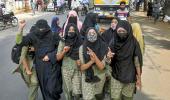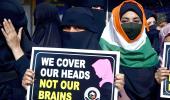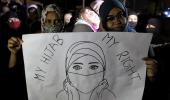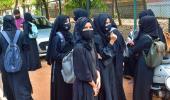The courts are not forums to solve "theological questions", Supreme Court judge Justice Sudhanshu Dhulia said on Thursday in his verdict on the Karnataka hijab ban controversy.
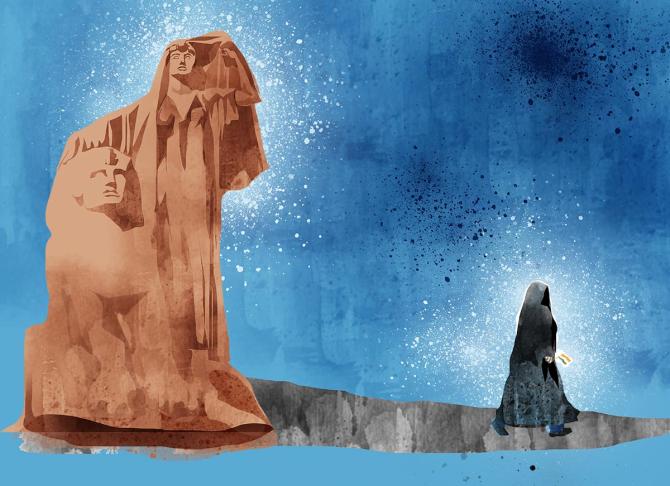
A bench of Justices Hemant Gupta and Sudhanshu Dhulia delivered a split verdict and referred the matter to the Chief Justice of India for constitution of an appropriate bench to consider the contentious issue.
While Justice Gupta dismissed the appeals challenging the March 15 judgment of the Karnataka high court which had refused to lift the ban, Justice Dhulia held that there shall be no restriction on wearing hijab anywhere in the schools and colleges of the state.
In his separate judgment, Justice Dhulia noted that apart from the fact that essential religious practice was not essential to the determination of the dispute, there was another aspect that is even more important, which would explain as to why the courts should be slow in the matters of determining as to what is an essential religious practice.
"In my humble opinion courts are not the forum to solve theological questions. Courts are not well equipped to do that for various reasons, but most importantly because there will always be more than one viewpoint on a particular religious matter, and therefore nothing gives the authority to the court to pick one over the other," he said in his 73-page verdict.
Justice Dhulia said the courts, however, must interfere when the boundaries set by the Constitution are broken or where unjustified restrictions are imposed.
Referring to the apex court verdict in the Ram Janambhoomi case, he noted that the top court had cautioned not to venture into areas of theology with which the courts are not well equipped.
"There may be diversity of views within a religion and to choose one over others, may not be correct. Courts should steer clear from interpreting religious scriptures," he noted.
Justice Dhulia said as to what constitutes an essential religious practice, in all its complexities, is a matter which is pending consideration before a nine-judge Constitution bench of the apex court and therefore, it may not be proper for him to go any further into this aspect.
He observed that the Karnataka hijab ban case is "squarely covered" by the case of Bijoe Emmanuel and the ratio laid down there.
"The decision which is of essential importance in this case for our purposes is the decision given by this court in the case of Bijoe Emmanuel.
"It is necessary to refer to this case in some detail, as in my opinion this case is the guiding star which will show us the path laid down by the well-established principles of our constitutional values, the path of understanding and tolerance, which we may also call as 'reasonable accommodation', as explained by some of the lawyers before this court," he said.
In the Bijoe Emmanuel case, the apex court had upheld the right of the students belonging to Jehovah's Witnesses not to sing the national anthem during the school prayer though the students stood up and extended all respect.
In that case, the court held the real test of a true democracy is the ability of even an insignificant minority to find its identity under the Constitution.
"The girls before us today face the same predicament as the Jehovah's Witnesses in the above case. The present petitioners too wear hijab as an article of their faith. They too believe that it is a part of their religion and social practice," Justice Dhulia said.
He noted that the approach of the high court could have been different and instead of straightaway taking the essential religious practice route, as a threshold requirement, the court could have first examined whether the restriction imposed by the school or the government order on wearing hijab were valid restrictions.
The state government's February 5, 2022, order had banned wearing clothes that disturb equality, integrity, and public order in schools and colleges
On March 15, the high court had dismissed the petitions filed by a section of Muslim students of the Government Pre-University Girls College in Karnataka's Udupi seeking permission to wear the Muslim headscarf inside classrooms, ruling it is not a part of the essential religious practice in Islamic faith.
